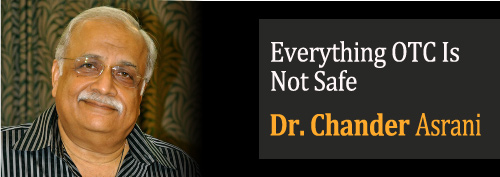Everything OTC Is Not Safe
A 14 year old was rushed to the clinic, one morning; severely breathless, almost in respiratory distress with fingertips turning faint blue. I was zapped; although the child was a known case of asthma, he was doing very well on the inhaler therapy initiated.
Child had to be hospitalized for oxygen, intravenous medications and nebulized. On detailed history it was discovered that child had had a fall the previous evening and mother had given some medicine she had bought from the chemist, which contained Ibuprofen. Although, Ibuprofen may be considered safe in children with asthma, this child belonged to the small percentage of sensitive ones and Ibuprofen is not a OTC drug in India!
In another instance a child, under treatment for fever and acute bronchitis had to be evaluated for meningitis/ encephalitis as he was excessively drowsy, was not responding to verbal commands and was not taking feeds. The results of all tests were negative. The drowsiness was attributed to mother giving another cough syrup in addition to physician prescribed medicines and that too in higher than ideal-for-age-dose. It was a case of an anti histaminic (known to give drowsiness even in therapeutic doses) given more than twice the therapeutic dose.
OTC (Over The Counter) medications are considered safe essentially because they are available without a doctor’s prescription (in India, virtually everything is barring sedatives) and are advertised in lay press with tall claims. What parents miss out are the disclaimers in font size 6-8 in print media or in unreadable colours on television.
It is advisable to exercise caution while giving these OTC medicines; following tips may help:
- For kids below 5, refrain from using any medicine NOT advised/ okayed by his/ her doctor.
- If you are giving any prescription medicines, confirm with your doctor before giving any OTC medicine, even if earlier your doctor may have approved the same as there may be some drug interaction that may enhance/ ameliorate the desired therapeutic effect of the prescription medicine.
- Read the facts of the constituents on the medicine label carefully. Make sure you know what the medicine contains and understand any warnings or possible adverse effects.
- If you don’t comprehend something about the medicine, ask your doctor.
- Do not give a higher dose of the medicine than recommended just because you want faster effect; also don’t give the medicine more frequently than recommended.
- When giving medicine to children, use the correct measuring device to ensure you are giving the right amount; don’t give approximate dosage thinking it is a safe medicine.
- Giving a child a correct drug dose is tricky. Although the bottle mentions dose in terms of age ranges (e.g. children aged 2-3 or 3 to 6 or 6 to 12); age is not the right criterion. We all know that kids vary greatly in weight/ size within any age range and in the medical world, child’s weight is used to determine exact dose of any drug to be administered; it applies to OTC drugs as well. If the bottle does not mention doses, do not guess! Ask your doctor.
- Don’t mix medicine into child’s food as it may change the way the medicine is supposed to work.
- Don’t mix medicine into hot / warm water, unless specifically advised; the heat may nullify the effect of the medicine.
- Always keep track of any adverse reactions (skin rash, vomiting, drowsiness) your child may have to OTC medicines and report to your doctor so that in future, same ingredients can be avoided.
- If taking two different OTC medicines, check drug labels to check whether they contain the same active ingredients. This can help avoid giving double (too much) dose of a particular medicine.
- In recent past, US FDA had issued a public health advisory “Over-the-counter (OTC) cough and cold products should not be used to treat children less than 2 years.” There has been limited research in children below 4 years of age, when it comes to effectiveness and safety of cough and cold OTC medicines. With lax legal framework in India, it is recommended parents should not give OTC cough or cold preparations to children below 4 unless confirmed by their doctor with specific instructions on dosing.
Remember the constituents of an OTC preparation are the same ingredients used in prescription medicines. If they have similar effects, they will also have similar adverse effect profile! The marketers are out to get you exploiting some laws and big bucks on advertising.
Dr Chander Asrani, father to three daughters and grand father to one, is a post-graduate in Family Medicine. He has over 35 years in clinical practice, launched www.growingwell.com in 2000 and since then has been writing on various subjects. Know more about him at about.me/drasrani.
